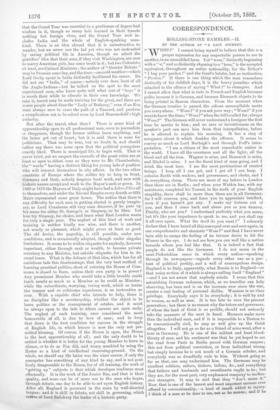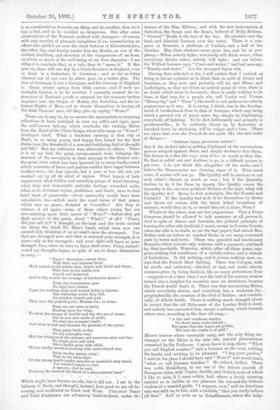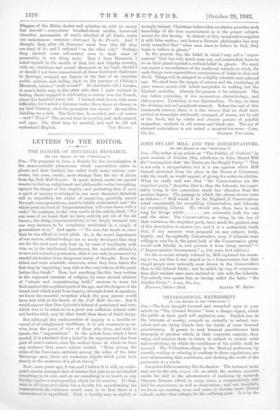CORRESPONDENCE.
" WOSS P'' I cannot bring myself to believe that this is a proper expression for any respectable person to use to another, in an unmodified form. Yet " woss," distinctly beginning with a" w," and as distinctly rhyming to a " hoss," is the accepted equivalent, throughout an entire nationality, for the Briton's "I beg your pardon I" and the Gaul's briefer, but as instinctive, "Pardon I" If there is one thing which the man remembers distinctly of his childish days, it is the heavy penalties which attached to the offence of saying " What ?" to strangers. And I cannot allow that what is rude in French and English becomes polite because it is German, and because Bismarck objects to its being printed in Roman characters. From the moment when the German frontier is passed, the odious monosyllable meets you everywhere. "Woes A" if you ask your way ; "Woes P" if you want to know the time; " Woss P" when the bill is called for; always Woss P" The German will never understand a foreigner the first time he speaks to him ; and no care or inventiveness on the speaker's part can save him from that interpellative, before he is allowed to explain his meaning. It has a ring of arrogance about it which doubles the offence. It seems to convey as much as Lord Burleigh's nod through Puff's inter- pretation. "I am a citizen of the most remarkable nation in the world. I have all the sweetness and all the light; all the blood and all the iron. Wagner is mine, and Bismarck is mine, and Hiiekel is mine. I am the finest kind of man going, and I drink the most beer. I am the most pertinacious of created beings. I keep all I can get, and I get all I can keep. I colonise Earth with.waiters, and governesses, and clerks, and I do everything cheap. There are more of my bakers in London than there are in Berlin ; and when your Watkin has, with my assistance, completed his Tunnel, in the teeth of your English stupidity, there shall be more than there are in all Germany, for I will overrun you, and force you to appreciate intellect, even if you haven't got any. I make my fortune out of you, and then I come back and abuse you as you deserve. Finally, who are you P I understand perfectly what you mean, but it's like your impudence to speak to me, and you shall say it all over again. What the devil do you want P" I solemnly declare that I have heard all this conveyed over and over again, in one comprehensive and stentoric "Woss ?" and that I have never been able to escape the feeling of an intense desire to hit the Wosser in the eye. I do not see how.you can well like a nation towards whom you feel like that. It is indeed a fact that people do not like the Germans. I do not mean in the semi-Pickwickian sense in which every nation—speaking through its newspapers—regards every other one as a por- tent of political perfidy, and a well of unscrupulous design. England is to Italy, apparently, what Russia is to England—or that noisy section of it which is always calling itself "England" —and I am not aware that anybody minds. I mean that this astonishing German rudeness, which, as no traveller can help observing, has been and is on the increase ever since the war, creates a real feeling of personal dislike. Wossism is no class privilege. Everybody says it to everybody ; it is said, by and to women, as well as men. It is too late to cure the present generation; but there is no reason why the tutors and governors, of whom the land of Geist is BO prolific, should not seriously take the manners of the next in hand. Manners make more than the individual man, and if it is impossible to a Teuton to be conventionally civil, he may as well give up the Geist altogether. I will not go so far as a friend of mine went, after a tour in Germany. He is one of the mildest and least blood- thirsty of men, and his sentiment was that he yet hoped to see the road from Paris to Berlin paved with German corpses ;
this not from political conviction, or from individual wrong, but simply because he is not much of a German scholar, and everybody was so dreadfully rude to him. Without going so far as that, one may understand him. The Germans may be excellent soldiers, sailors, tinkers, tailors, &c., and everything
that fathers and husbands and sweethearts ought to be ; but they are, for the most part, very unpleasant company' to inoffen; sive strangers. It may be said that they "don't mean it. Now, that is one of the lamest and most impotent excuses ever offered by conventionality,—a kind of insult added to injury. I think of a man as he does to me, not as he means;
and if he
is so constituted as to mean one thing and do another, then he is but a fool, and to be avoided as dangerous. But after some• observations of the Teutonic method with strangers—of course, with any number of pleasant exceptions (I am remembering an .officer who guided me over the stoUt fortress of Ehrenbreitstein, the other day, and hereby tender him my thanks, as one of the civilest, kindliest, and cheeriest of the companions of an hour, on whom so much of the well-being of our lives depends)—I am obliged to conclude that, as a rule, they do "mean it." If this goes on, there will one day be a Deutschenhass in England, even as there is a Judenhass in Germany ; and as far as being elbowed out of our own by aliens goes, on a better plea. The Jew of Germany is not a foreigner, and the German of England is. Great events spring from little causes ; and if such un- desirable friction is to be avoided, I earnestly counsel the in- structors of Teutonic youth to suspend for the moment farther inquiries into the Origin of Matter, the God-Idea, and the in- herent Rights of Man, and to devote themselves to boxing all the little Teutons' ears, till they give up saying "Woes P" These are, it may be, by no means the appropriate or inspiring reflections to have indulged in over my coffee and cigar, upon the well-known balcony which overlooks the rushing Rhine from the Hotel of the Three Kings, where this essay on "Woes?" developed itself. What a dramatic opening is that city of Basle, to so many young and happy feet, bound for the first Swiss tour, the threshold of a new and fertilising field of thought and life ! But my reflexions were alternative to others. There it is at our feet, the great, tawny-maned river, bringing the murmur of the mountains as their message to the distant sea ; the great river which has been hymned by so many bards, round ivhich centuries of fierce and jealous conflict have raged between brother-men,—its last episode, but a year or two old, not yet washed out by all its whirl of waters. What legacy of hate sUppressed, what hidden and corroding pangs of heart-bulning, what- deep and honourable patriotic feelings wrenched aside, what seeds of future rapine, pestilence, and death, were in that fatal want of generosity—where generosity would have been calculation, too—which made the cruet terms of that peace, which was no peace, dictated at Versailles ! Are they to witness it all again—some of those whose young lips are now entering upon their career of "Woes P"—before they get their ansWer to the great, dread "What?" of all? "Peace, did you call it ?" I thought, as the boat and the train carried me along the fated. No Man's Land, which even now one cannot help thinking of as no man's save the strongest. You that are strongest now, and that so misused your strength, it is yours only as the strongest ; and your right will lapse as your etrength does, when its turn to lapse shall come. Peace, indeed —and my thoughts began, in spite of me, to shape themselves
in song :—
"Peace ! wherefore comest thou,
With dark and ominous brow, With naked sword before thee, begirt with blood and flame, With feet to the ankles red, Armed and helmeted, And in thy month the message of intolerable shame ?
From thy remorseless eyes No light that vivifies .Upon the wailing cities and wasted fields is thrown : But withering where they fall, On stricken hearth and wall, They turd the palsied gazer, Medusa-like, to stone.
Thou art not come to bring Healing upon thy wing, To stem the stream of trouble and dry the sea of tears ; But to sow new seeds of strife, To whet the avenger's knife, And blast in bud and blossom the promise of the years.
Thou goest forth to-day On thy triumphal way, Mid the whispers of the nations, and murmurs near and far; No virgin pure and mild, But a harlot great with child, Whose deadly womb is teeming with undeveloped war.
Raise we thy statue, raise That in the after-days Of the strong man's tender mercies as memorial may stand, For wearied hearts to hail, A spectre, clad in mail, Draining the starved life-blood of a dismembered land." . ....... . .
Which might have become an ode, but it did not. I sat in the balcony of Basle, and thought, instead, how good we are all be- coming, and meditated on Geist and Woes. Universal Peace and Total Abstinence are advancing hand-in-hand, under the
banner of the Blue Ribbon ; and with the new instruments of Salvation, the Songs and the Bones, beloved of Bully Bottom. " General " Booth is the fact of the day. He presides over the land, and Admiral Lawson over the water. There is a con- gress at Brussels, a platform at Carlisle, and a hall at the Grecian. May their shadows never grow less, and let us pro- phesy,—When nobody fights, 'everybody will drink water; when everybody drinks water, nobody will fight ; and not before. Sir Wilfred Lawson says, "Peace-and-water ;" and bad men say, "Brandy-and-water." Let the strongest liquor win.
Having thus reflected so far, I will confess that I arrived at being so far an optimist as to think that, in spite of Alsace and Lorraine, as they were and probably will be, and Elsass and Lothringen, as they are (from an artistic point of view, there is no doubt which must be favoured ; there is really nothing to be done, in that way, for a people who call Venice and Vienna "Benny-dig" and " Ween "), the world is not quite so too utterly pugnacious as it was. It is owing, I think, less to the develop- ment of brotherhood than to that of firearrns, which may bring about a general era of peace some day, simply by frightening everybody off fighting. To be shot deliberately and properly is gentlemanlike; to he suddenly blown up by dynamite, or knocked down by electricity, will be vulgar, and a bore. There are signs that even the French do not quite like the new order of things,— " Delirant reges, plectuntur Aohivi."
But if the Achivi take to getting frightened at the unconscious powers arrayed against them, and simply decline to face them, like horses in a fire, the reges may claire as much as they like. He that is called out and declines to go, is a difficult person to get over, I do not think this altogether off the cards, and I believe the Democracies are showing signs of it. Wars must cease, if armies will not go. The Quality will he anxious to cut each other's throats as much as ever ; but if the Quantity decline to do it for them by deputy (the Quality versus the Quantity is the one true political division of the day), what will the Quality do ? Recur to first principles, like the Horatii and Curiatii ? If the Quality had to do it for themselves by threes and threes (of course, with the latest lethal inventions of science), would they do it, or would they let it alone, Woss ?
Whatever the cause, men are less pugnacious. That a Peace Congress should be allowed to talk nonsense at all, proves it And in spite of Alsace and Lorraine, the judicial principle of hearing the other side (judicial, I mean, except in County Courts, when one side is in trade, as see the last paper), had struck Mrs. Balbus and me before we reached Basle, in our many-countried rush by tower and town. There was peaceful and reactionary Brussels, where you are only welcome with a passport ; and hard by, that-inevitable Waterloo, which, after all these years, sug- gests nothing but omnibuses of a certain colour, and a statute of limitations. It did nothing, and it Proves nothing now, ex- cept that the French liked fighting. There was Cologne, with its smells and cathedral,—finished at last, and made utterly common-place by being finished, like so many pretentious lives —suggestive of a time when I saw the hall of the railway-station turned into a hospital for wounded men on stretchers, because the French would begin it. There was that astonishing Rhino, which everybody abuses, and everybody has a weakness for: geographically, the creation of the God of Battles ; and touristi- cally, of Albert Smith. There is nothing much changed about it, except that the old Echo-man of the Loreley Rook is dead, and nobody has succeeded him, except a railway, which tunnels where once, according to the dear old song,— " A fair and wondrous maiden On those same rooks behold ;
The gems that she wears are golden, The hair she combs is of gold."
Miners burrow where mermaids sang, and the only thing un- changed on the Rhine is the rain—the natural phenomenon remarked by the Professor, I never knew it stop, there. "What you call English weather!" said a German on the boat, rubbing Ms hands, and wishing to be pleasant. "I beg your pardon," I said (in his place I should have said "Woes P" and saved time), "what we call German weather!" He retired, baffled. There was noble Heidelberg, to me one of the fairest quartet of European cities, with Venice, Seville, and Oxford, none of which I like to miss, if I come within bail, where a lovely morning enabled us to imbibe at our pleasure the cut-and-dry historic wisdom of a wearied guide, " I suppose, now," said an American who was with us, to him, with a twinkle," that you really believe all that." And so even on to Schaffhausen, where the baby- Niagara of the Rhine clashes and splashes on, with no enemy but herself— everywhere knocked-about castles, burnt-out churches, monuments of man's mischief of all kinds, under one monotonous sentence—destroyed by the French. And I thought that, after all, Germans must bear this till they are tired of it ; and I reflected " oa the other side." Perhaps they showed some self-control even in their want of generosity, in not doing more, Had I been Bismarck, I asked myself, in the middle of that fair and fidgetty country, with my victorious and armed thousands at my back, should I or should I not have remembered all those destroyed challenges to Revenge, snapped my fingers in the face of an impotent public opinion, and, falling back on the practice of Christy's Minstrels, taken a " walk round ?" So charitable did I become, in man's fickle way, to the other aide, that I quite rejoiced in finding Basle engaged in celebrating a victory over the French, about five hundred years old. I learned what it was with some difficulty, for I asked a German waiter three times at dinner, in my best German, what the 'procession was about? He was then handing me a dish. The first time he scowled, and—of course —said" Woss ?" The second time he scowled, and said, spinach and eggs. The third time he scowled, and said he did not




































 Previous page
Previous page